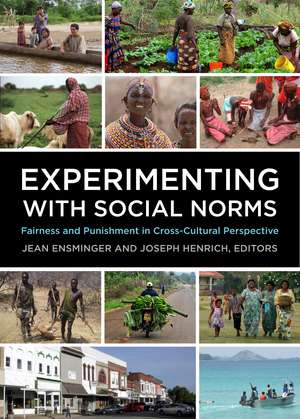Experimenting with Social Norms: Fairness and Punishment in Cross-Cultural Perspective: Russell Sage Foundation Series on Trust
Editat de Jean Ensminger, Joseph Henrichen Limba Engleză Paperback – 29 ian 2014
Questions about the origins of human cooperation have long puzzled and divided scientists. Social norms that foster fair-minded behavior, altruism and collective action undergird the foundations of large-scale human societies, but we know little about how these norms develop or spread, or why the intensity and breadth of human cooperation varies among different populations. What is the connection between social norms that encourage fair dealing and economic growth? How are these social norms related to the emergence of centralized institutions? Informed by a pioneering set of cross-cultural data, Experimenting with Social Norms advances our understanding of the evolution of human cooperation and the expansion of complex societies. Editors Jean Ensminger and Joseph Henrich present evidence from an exciting collaboration between anthropologists and economists. Using experimental economics games, researchers examined levels of fairness, cooperation, and norms for punishing those who violate expectations of equality across a diverse swath of societies, from hunter-gatherers in Tanzania to a small town in rural Missouri. These experiments tested individuals’ willingness to conduct mutually beneficial transactions with strangers that reap rewards only at the expense of taking a risk on the cooperation of others. The results show a robust relationship between exposure to market economies and social norms that benefit the group over narrow economic self-interest. Levels of fairness and generosity are generally higher among individuals in communities with more integrated markets. Religion also plays a powerful role. Individuals practicing either Islam or Christianity exhibited a stronger sense of fairness, possibly because religions with high moralizing deities, equipped with ample powers to reward and punish, encourage greater prosociality. The size of the settlement also had an impact. People in larger communities were more willing to punish unfairness compared to those in smaller societies. Taken together, the volume supports the hypothesis that social norms evolved over thousands of years to allow strangers in more complex and large settlements to coexist, trade and prosper. Innovative and ambitious, Experimenting with Social Norms synthesizes an unprecedented analysis of social behavior from an immense range of human societies. The fifteen case studies analyzed in this volume, which include field experiments in Africa, South America, New Guinea, Siberia and the United States, are available for free download on the Foundation’s website:www.russellsage.org.
Preț: 279.72 lei
Nou
Puncte Express: 420
Preț estimativ în valută:
53.53€ • 55.68$ • 44.19£
53.53€ • 55.68$ • 44.19£
Carte indisponibilă temporar
Doresc să fiu notificat când acest titlu va fi disponibil:
Se trimite...
Preluare comenzi: 021 569.72.76
Specificații
ISBN-13: 9780871545008
ISBN-10: 0871545004
Pagini: 492
Dimensiuni: 168 x 235 x 20 mm
Greutate: 0.34 kg
Editura: Russell Sage Foundation
Colecția Russell Sage Foundation
Seria Russell Sage Foundation Series on Trust
ISBN-10: 0871545004
Pagini: 492
Dimensiuni: 168 x 235 x 20 mm
Greutate: 0.34 kg
Editura: Russell Sage Foundation
Colecția Russell Sage Foundation
Seria Russell Sage Foundation Series on Trust
Recenzii
“Experimenting with Social Norms is a valuable summary of fifteen years of important cross-cultural work using methods drawn from experimental economics that places this work in the larger world of behavioral sciences. It is an essential reference for anybody interested in the evolution of cooperation.”
—ROBERT BOYD, Origins Professor, School of Human Evolution and Social Change, Arizona State University
—ROBERT BOYD, Origins Professor, School of Human Evolution and Social Change, Arizona State University
“Experimenting with Social Norms cleverly combines insights from economic experiments and evolutionary approaches to develop cross-cultural foundations for fairness and punishment norms. The treasure trove of information in this volume provides important insights in the role of norms in both small-scale and more complex societies. It will excite the serious scientist and the interested layperson.”
—ERNST FEHR, Professor of Microeconomics and Experimental Economic Research and Chair, Department of Economics, University of Zurich
—ERNST FEHR, Professor of Microeconomics and Experimental Economic Research and Chair, Department of Economics, University of Zurich
Notă biografică
JEAN ENSMINGER is Edie and Lew Wasserman Professor of Social Sciences at the California Institute of Technology. JOSEPH HENRICH is professor of psychology and economics at the University of British Columbia.












